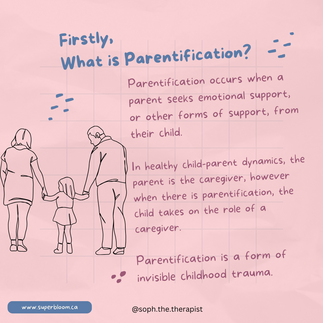How Parentification Trauma can Influence our Relationship with Food
- Sophia Wolsfeld

- Nov 6, 2023
- 2 min read
Updated: Jul 17, 2024
Growing up, some may played the role of the "little adult", shouldering responsibilities beyond their years. This experience is often referred to as parentification.
Parentification is when the roles of the parent and child are reversed; the child is expected to provide emotional or practical support, rather than being the one who receives that support from their caregiver.
No child deserves to be propelled into a caregiving role not of their choosing and the impacts of parentification are real, which can range from difficulties with relationships to struggles with mental health.
Those who have experienced the invisible childhood trauma of parentification, may have also noticed impacts on their relationship with food.
As a child struggling through parentification,
🤍 Some found solace, comfort, and distraction in food's embrace.
🤍 Some may have restricted food to distract from emotional pain or to regain a sense of autonomy in a situation that felt powerless.
🤍 Some may have used food to fill in the emotional gaps left by those who were supposed to attend to our emotional needs but fell short.
Swipe through these below pictures to learn more about the possible complex connection between parentification trauma and our relationship with food.
We do the best can with the tools that we have. Using food as a tool is not a sign of weakness, but rather a testament to adaptability and resilience.
Looking for support to heal after parentification? Book a free 15 minute consultation to learn how therapy may help: https://superbloomwellness.intakeq.com/booking
Here are some examples of areas to explore to help you move forward after parentification:

Whatever your experience was, you deserve so much compassion, gentleness, and kindness.
About the Author
Sophia is a trauma therapist, a dietitian, and most importantly, a fellow human navigating the complexities of the human experience. She holds both a Bachelor of Science in Nutrition and a Master of Arts in Counselling Psychology. She is deeply passionate about walking alongside clients looking to heal from various forms of trauma, such as complex trauma (including C-PTSD), betrayal trauma, relationship trauma, childhood trauma, parental trauma, narcissistic abuse, and/or intergenerational trauma. She specializes in supporting clients through healing the impacts that trauma can have on their most important relationships: including their relationship with self, with others, with their body, and with food. She draws from numerous trauma-focused modalities including EMDR, Internal Family Systems (IFS), Somatic and Mindfulness-Based Approaches, Attachment Theory, Polyvagal Theory, and Psychodynamic Therapy.














Comments